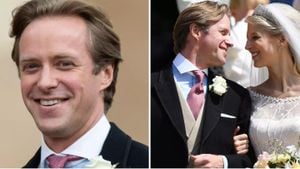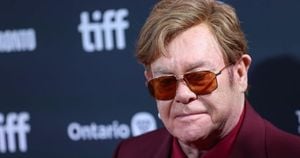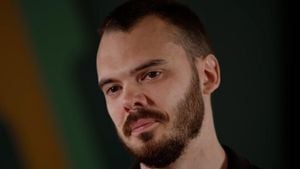NATO members are currently grappling with the far-reaching consequences of Russia's continued aggression toward Ukraine, as they simultaneously await the potential political shift brought about by the return of Donald Trump to the White House. This complicated situation has led, at least according to Latvia's foreign minister Baiba Bra, to many allies hesitating on whether to admit Ukraine to the alliance. "It’s almost like we’re all sitting around the table, wondering what Donald Trump will do next," Bra remarked, highlighting the tension of waiting for the new U.S. administration to stabilize the alliance’s position.
On the battlefield front, the situation remains dire for Ukraine. The Kremlin has engaged in continued military operations, capturing villages and threatening key regions like Donbas. Russia’s strategy appears to involve systematic offensives accompanied by specific military drills. Just last week, several Russian frigates armed with cutting-edge hypersonic cruise missiles conducted military exercises off the eastern Mediterranean coast. These demonstrations of military capability are not only impressive but alarming, particularly when considering President Putin's decision to lower the nuclear threshold he has previously maintained.
Reports recently corroborated by Yale's School of Public Health presented eye-opening statistics, noting at least 314 Ukrainian children were forcibly taken to Russia as part of Kremlin-funded initiatives aimed at 'Russifying' the population. These actions are part of broader accusations of war crimes against Putin, as he faces growing international scrutiny. The report is set to be delivered to the UN Security Council, leaving many to wonder about the next course of action on the humanitarian front.
British Foreign Secretary David Lammy recently voiced the UK's support for astonishingly increased military backing for Ukraine during discussions with NATO allies. He underscored the principle, stating, "99% of military support to Ukraine has been from NATO allies. This support is instrumental for Ukraine to defend against Russian aggression." His remarks came amid growing fears over the potential impact of Trump re-entering the political scene and whether NATO operations would remain consistent. Having promised to conclude the Russia-Ukraine conflict swiftly, there is skepticism around Trump’s plans, but the reverberations of his potential election remain palpable.
Yet the question lingers: what will happen if NATO members follow Trump's lead? Senator Baiba Bra expressed unease over inviting Ukraine to join the alliance during active conflict, though she herself believes the battle-hardened military would be more than capable of contributing significantly to NATO efforts.
Another notable development includes the return of the controversial commentator Tucker Carlson to Russia, where he is set to interview Foreign Minister Sergey Lavrov. Carlson, who previously faced backlash for the manner of his interview with Putin, suggests his second conversation will air soon. Critics fear he may avoid pressing Lavrov on pressing issues such as war crimes, leaving many disillusioned over the dialogue surrounding the conflict.
Turning to military capabilities, Russian Navy frigates conducted drills showcasing their hypersonic missile technology, claiming superiority over their Western counterparts. Images released by the Russian Defense Ministry displayed the cutting-edge Zircon missiles being fired during maneuvers, which have raised alarm among NATO members. The assertion is made more troubling with revelations of North Korean troops deploying to aid Russia's military actions—this shows no invention of international military cooperation is off the table for Putin.
Ukraine isn't taking these developments lying down. President Volodymyr Zelensky has informed his followers about their efforts to speed up domestic missile production. His move echoes Ukraine's resolve to bolster its defenses, recognizing the continuing threat posed by Russian airstrikes targeting energy grids as winter approaches yearly. These maneuvers are indicative of Ukraine’s strategic push, intending to mitigate the daily damage caused by relentless Russian aggression. Zelensky’s determination leads us to question how Ukraine can shift the balance of power back toward itself.
The possibility of NATO troops being deployed to help monitor future ceasefires remains on the table, though this situation is fraught with complexity and risk. NATO officials suggest impending peace talks between Moscow and Kyiv are becoming more plausible, albeit with potentially significant compromises from Ukraine's side. Some European diplomats privately caution about Ukraine's imminent need to negotiate, speculating territories may have to be ceded if peace is to be attained.
The push for discussion brings forth questions about international commitment levels among member states. Should Ukraine join NATO with active conflict pressing on its borders? Ukrainian leadership has grown weary of Western promises, drawing scrutiny from political leaders attempting to navigate the intricacies of defense and diplomacy going forward. The eventual plan must prioritize security and cooperation—any hesitation could embolden Russian ambitions even more.
Consequently, as the players involved re-evaluate their approaches moving forward, it’s evident this conflict continues to evolve, pressing NATO and its allies to reconsider tactics and levels of support for Ukraine. With the balance of power shifting, it raises distinct dialogues around military engagement, regional security, and diplomatic conversations. The uncertainty surrounding future geopolitical alignments leaves many anticipating how the players will adjust, especially as the clock ticks toward more tumultuous seasons.



